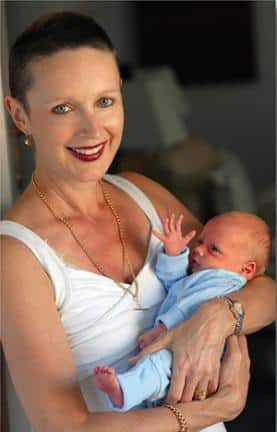
At 41, Tanya’s life seemed all in order. She was fit, healthy and happy, and had looked after herself: exercising regularly, eating the right things, didn’t smoke and was a moderate drinker.

At 41, Tanya’s life seemed all in order. She was fit, healthy and happy, and had looked after herself: exercising regularly, eating the right things, didn’t smoke and was a moderate drinker.
“Mike and I had decided to try for a baby so we were delighted, with age against us, that we were pregnant after only six months of trying,” Tanya said.
Finding out she had cancer, then, was a complete shock.
Luckily for Tanya and her family, her specialists at Calvary Mater Newcastle had the latest information. They knew that chemotherapy and radiation therapy would give her a 75 per cent chance of being alive in 10 years, compared to just 50 per cent without the therapy.
“My oncologist and oncological surgeon and radiation oncologist all relied on research to determine whether it was possible to continue with the pregnancy,” Tanya said.
It was a major point of consideration for Tanya and Mike. If Tanya’s life expectancy was compromised, it was a difficult decision to bring a baby into this world knowing that she would not be around to raise the child.
“It was a decision based on research evidence, and my life expectancy with or without the pregnancy.”
“I was fortunate that my life expectancy was only minimally changed if we proceeded with the pregnancy, so we thought the odds were worth trying. I had to take the treatment.”
“I started chemo in the second trimester of my pregnancy, because we knew that research had determined that this was safe.”
Luke was born four weeks early, so Tanya could begin radiation treatment, without too big a gap between radiotherapy and the chemotherapy.
She is now taking a drug every six months for three years to help prevent the cancer returning in her bones.
“Medical research helped us because we were able to take away facts and make crucial decisions about my life and that of our baby.”
“The research is important to us, because I want to be around to see Luke grow up, watch the milestones, go to Uni, get married…
“Without research, they may not find a cure. I am sure I am cured, I must remain positive. I have cancer, but cancer does not have me.”
Hunter research is contributing to improved treatments for and prevention of early and recurrent breast cancer. Prevention research has shown that close to half of the hormone sensitive breast cancers can be prevented from recurring by a daily tablet called Tamoxifen.
Current breast cancer research is testing new targeted treatments for different sub types of breast cancer, optimal use of radiotherapy for early breast cancer, and strategies to manage long-term risk after breast cancer to prevent it recurring.
HMRI would like to acknowledge the Traditional Custodians of the land on which we work and live, the Awabakal and Worimi peoples, and pay our respects to Elders past and present. We recognise and respect their cultural heritage and beliefs and their continued connection to their land.

Hunter Medical Research Institute
We’re taking healthy further.
Locked Bag 1000
New Lambton
NSW, Australia, 2305



This site is protected by reCAPTCHA and the Google Privacy Policy and Terms of Service apply.
Copyright © 2024 Hunter Medical Research Institute | ABN: 27 081 436 919
Site by Marlin Communications
